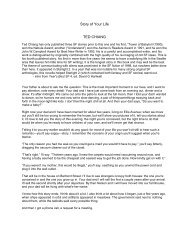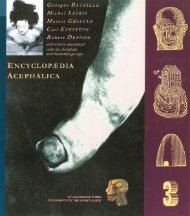SITUATIONISTS AND THE 1£CH MAY 1968
umMYFs
umMYFs
You also want an ePaper? Increase the reach of your titles
YUMPU automatically turns print PDFs into web optimized ePapers that Google loves.
which it served both as a regulating mechanism<br />
for power and as a source of recruits for the<br />
more dubious forces of order:. cops, informers,<br />
hired thugs, artists ... Nevertheless, the lumpenproletariat<br />
embodies a remarkably radical<br />
implicit critique of the society of work. Its open<br />
contempt for both lackeys and bosses contains a<br />
good critique of work as alienation, a critique<br />
that has not been taken into consideration until<br />
now because the lumpenproletariat was the sector<br />
of ambiguities, but also because during the<br />
nineteenth century and the beginning of the<br />
twentieth the struggle against natural alienation<br />
and the production of well-being still appeared<br />
as valid justifications for work.<br />
Once it became known that the abundance<br />
of consumer goods was nothing but the flip side<br />
of alienation in production, the lumpenproletariat<br />
acquired a new dimension: it liberated a contempt<br />
for organised work which, in the age of<br />
the Welfare State, is gradually taking on the proportions<br />
of a demand that only the rulers still<br />
refuse to acknowledge. In spite of the constant<br />
attempts of power to recuperate it, every experiment<br />
carried out on everyday life, that is, every<br />
attempt to construct it (an illegal activity since<br />
the destruction of feudal power, where it was<br />
limited arid restricted to a minority), is concretised<br />
today through the critique of alienating<br />
work and the refusal to submit to forced labour.<br />
So much so that the new proletariat tends to<br />
define itself negatively as a "Front Against<br />
Forced Labour" bringing together all those who<br />
resist recuperation by power. This defines our<br />
field of action; it is here that we are gambling on<br />
the ruse of history against the ruse of power; it<br />
is here that we back the worker (whether steelworker<br />
or artist) who - consciously or not -<br />
rejects organised work and life, against the<br />
worker who - consciously or not - accepts working<br />
at the dictates of power. In this perspective,<br />
it is not unreasonable to foresee a transitional<br />
period during which automation and the will of<br />
the new proletariat leave work solely to specialists,<br />
reducing managers and bureaucrats to the<br />
rank of temporary slaves. In a generalised<br />
automation the "workers," instead of supervising<br />
machines, could devote their attention to<br />
watching over the cybernetic specialists, whose<br />
sole task would be to increase a production<br />
which, through a reversal of perspective, will<br />
have ceased to be the priority sector, in order to<br />
serve the priority of life over survival.<br />
22 Unitary power strove to dissolve individual<br />
existence in a collective consciousness<br />
so that each social unit subjectively<br />
defined itself as a particle with a clearly determined<br />
W\!ight suspended as though in oil.<br />
Everyone had to feel overwhelmed by the<br />
omnipresent evidence that everything was<br />
merely raw material in the. hands of God, who<br />
used it for his own purposes, which were naturally<br />
beyond individual human comprehension.<br />
All phenomena were seen as emanations of a<br />
supreme will; any abnormal divergence signified<br />
some hidden meaning (any perturbation was<br />
merely an ascending or descending path toward<br />
harmony: the Four Reigns, the Wheel of Fortune,<br />
trials sent by the gods). One can speak of a collective<br />
consciousness in the sense that it was<br />
simultaneously for each individual and for<br />
everyone: consciousness of myth and consciousness<br />
of particular-existence-within-myth.<br />
The power of the illusion was such that authentically<br />
lived life drew its meaning from what was<br />
not authentically lived; from this stems that<br />
priestly condemnation of life, the reduction of<br />
life to pure contingency, to sordid materiality, to<br />
vain appearance and to the lowest state of a<br />
transcendence that became increasingly<br />
degraded as it escaped mythical organisation.<br />
God was the guarantor of space and time,<br />
whose coordinates defined unitary society. He<br />
was the common reference point for all men;<br />
space and time came together in him just as in<br />
him all beings became one with their destiny. In<br />
the era of fragmentation, man is torn between a<br />
time and a space that no transcendence can<br />
unify through the mediation of any centralised<br />
power. We are living in a space and time that are<br />
out of joint, deprived of any reference point or<br />
coordinate, as though we were never going to be<br />
able to come into contact with ourselves,<br />
although everything invites us to.<br />
There is a place where you create yourself<br />
and a time in which you play yourself. The space<br />
of everyday life, that of one's true realisation, is<br />
encircled by every form of conditioning. The narrow<br />
space of our true realisation defines us, yet










